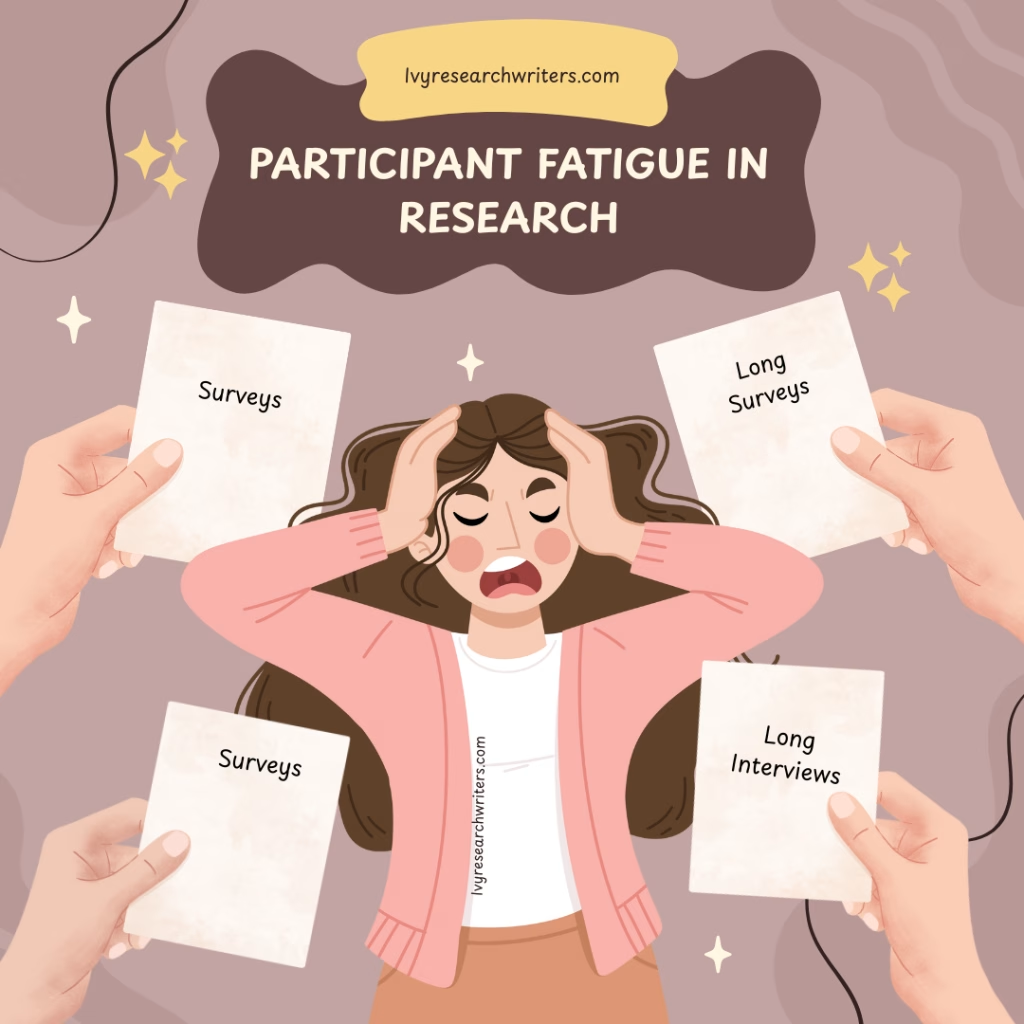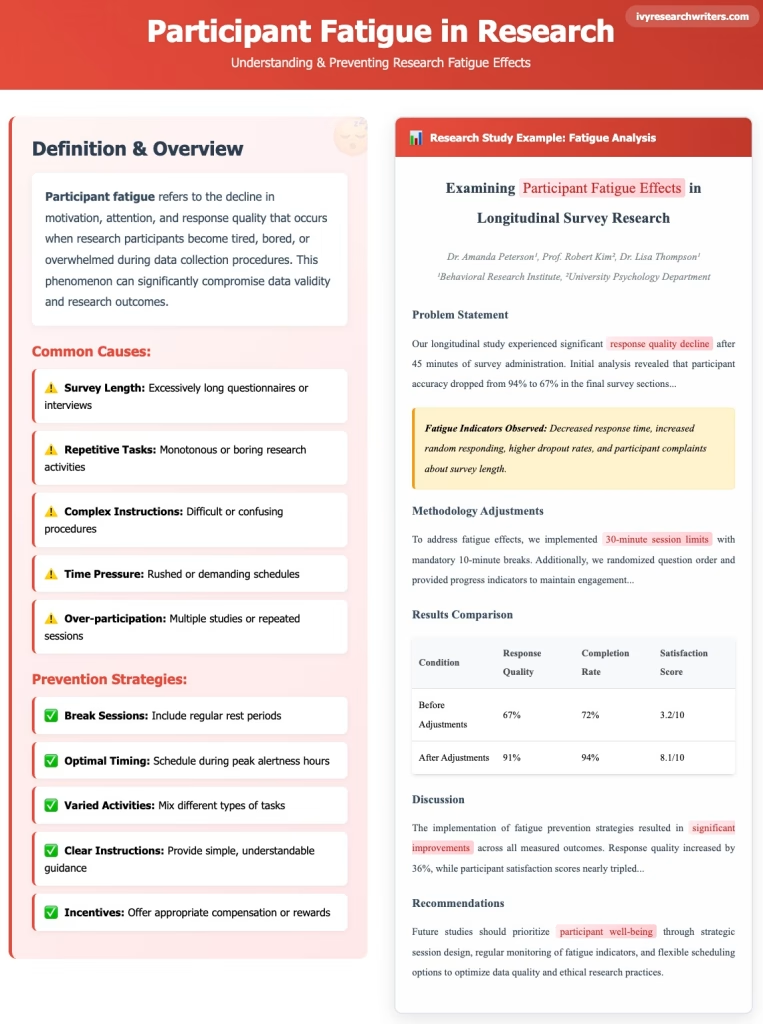Participant Fatigue in Research: Its Impact and Strategies for Improvement

Participant fatigue in research is a critical issue that can compromise the validity and reliability of study results. When participants experience fatigue effects, it leads to survey fatigue, deteriorating quality of responses, and lower response rates. Researchers must recognize the signs of research fatigue and implement strategies to mitigate its impact. In this post, we will delve into research fatigue, its consequences, and how it affects survey design, data collection, and the quality of the data.
What is Research Fatigue?
Research fatigue, also known as respondent fatigue, occurs when survey participants become tired or lose interest during the survey process. Survey participants may experience fatigue due to the length of the survey, questionnaire complexity, or repetitive nature of questions. As a result, they may give less thoughtful responses, fail to complete the survey, or even abandon it altogether. The fatigue effects psychology shows that when participants are fatigued, their attention span shortens, and their willingness to engage in the survey deteriorates.
For example, participants might begin answering questions more quickly, skip questions, or provide inconsistent answers. This phenomenon is known as survey fatigue, and it occurs when survey participants lose interest in the survey task and fail to complete the survey thoughtfully. The response fatigue could affect both qualitative and quantitative research, as it leads to satisficing, where participants opt for the quickest and easiest answers rather than engaging deeply with the survey.
Survey Fatigue: How It Affects Data Collection and Survey Design
One of the most common challenges in survey research is survey fatigue. As survey participants tire, the quality of the data deteriorates. This is especially prevalent in long surveys with numerous open-ended questions or poorly structured surveys that lose the attention of participants. The length of the questionnaire and the order of the questions can also influence how fatigue occurs.
When participants feel overwhelmed by the number of questions or the time to complete the survey, they may become tired of the survey task, reducing their effort to answer carefully. This results in lower response rates, incomplete answers, and inaccurate data, which undermines the results and possible outcomes of the study. In market research, for instance, when survey participants are subjected to long surveys, they may lose interest halfway through, which diminishes the quality of data collection.
Research Methods: Addressing Fatigue in Data Collection
Research methods play a vital role in how survey participants experience the survey task. When designing a research study, it’s essential to consider how fatigue can impact the quality of responses. For example, taking the survey may become overwhelming if the survey length is too long or the survey task is repetitive. Incorporating strategies to reduce fatigue, such as limiting the number of questions or optimizing question design, can enhance the quality of the data collected.
Furthermore, researchers should be mindful of the number of participants in the study and the impact of survey length on participation rates. If the survey task is too burdensome, participants may choose to abandon the survey, leading to lower response rates and incomplete data.
Designing a Research Study to Minimize Fatigue

When designing a research study, fatigue should be an important consideration. Studies must be crafted in such a way that participants are not overwhelmed by the survey task, which can negatively influence the quality of responses. Researchers should carefully consider the survey length, question types, and content to avoid causing survey fatigue. Open-ended questions, for example, may require more cognitive effort and time, potentially leading to fatigue among participants. Existing studies and sources of information about survey design can guide researchers in avoiding common pitfalls that lead to participant exhaustion.
Additionally, breaking the survey into manageable sections or offering breaks can help improve the study experience for participants and ensure they are able to complete the survey thoughtfully.
Future Work: Strategies for Reducing Fatigue
To minimize fatigue in future work, researchers need to assess and refine their survey methods continuously. Surveys may become less effective if participants fatigue and their responses deteriorate over time. Future research could examine how to incorporate more engaging survey tasks that are efficient yet comprehensive, as well as how the number of participants affects the quality of data collected.
Innovative survey methods could involve adaptive questionnaires that change based on the participant’s previous responses, reducing redundancy and enhancing engagement. Additionally, feedback from participants can offer insights into areas where the survey may be too long or taxing. As research methods evolve, understanding the dynamics of survey fatigue will become increasingly important in the development of more effective and engaging studies.
By considering fatigue in the designing of research studies, researchers can improve response quality and survey completion rates, leading to more reliable and insightful data in their future work.
Consequences of Research Fatigue
The consequences of research fatigue can be far-reaching, significantly affecting the study quality and the reliability of survey results. Some common consequences include:
- Incomplete Data: When participants skip questions or fail to finish the survey, it leads to missing data, which impacts the statistical analysis and may introduce bias in the findings.
- Lower Response Rates: Fatigue may result in low response rates, especially in longer surveys. As participants grow tired, they are less likely to engage, leading to fewer people completing the study.
- Inaccurate or Biased Responses: Survey fatigue can lead to satisficing, where participants give quick, inaccurate answers just to complete the survey. This can skew the study results and compromise the validity of the research.
- Dropout: As fatigue occurs, participants may choose to abandon the survey altogether, especially if it is too long or too complex. This contributes to a reduced sample size, which can affect the generalizability of the study’s findings.
These consequences can result in research participants providing less thoughtful responses or abandoning surveys midway, leading to biased research and compromised study results.
Strategies to Improve Survey Participation and Minimize Fatigue
To address survey fatigue and ensure the quality of the data, researchers can implement several strategies:
- Keep Surveys Short and Focused: One of the most effective ways to minimize survey fatigue is by reducing the length of the questionnaire. Break long surveys into shorter sections and ensure that each section is relevant to the research question. Concise surveys with a clear focus are more likely to keep participants engaged.
- Offer Incentives: Providing incentives for completing the survey can encourage survey participants to complete it fully. This could be monetary rewards, entry into a prize draw, or providing valuable feedback to participants.
- Use Engaging and Clear Survey Questions: The question type and clarity of the survey questions significantly impact fatigue effects. Use simple, clear, and well-structured questions. Open-ended questions should be used sparingly, as they are more time-consuming for respondents. Instead, use close-ended questions that are easier to answer quickly.
- Randomize Question Order: To avoid response bias, consider randomizing the order of the questions. This helps ensure that fatigue does not skew responses in favor of certain types of questions.
- Test the Survey: Before distributing the survey widely, conduct a pilot test to identify potential issues with length, wording, or flow. This test will help identify and address potential causes of research fatigue before collecting large-scale data.
Concerned about participant fatigue affecting your research results?
Let us help you design studies that minimize fatigue and ensure high-quality responses. Start optimizing your research process with expert guidance today!
Future Research: Addressing Fatigue in Survey-Based Studies
Future research on survey fatigue can delve deeper into how different types of survey design and questionnaire format affect the response rates and quality of data. Studies could explore how survey participants react to open-ended questions versus close-ended or scale-based questions, and whether offering more interactive formats, such as online surveys with multimedia elements, can reduce fatigue.
Moreover, researchers should continue exploring strategies to improve participant engagement without compromising the depth and quality of data. Examining the impact of research fatigue across different demographics and cultures could lead to more targeted survey designs that minimize fatigue and encourage better participation.
Conclusion
Survey fatigue is a significant challenge in data collection, particularly in long surveys or poorly designed questionnaires. The consequences of research fatigue can undermine the quality of the data and lead to inaccurate or biased results. Researchers must recognize the signs of survey fatigue early and implement strategies such as shorter surveys, clear questions, and engagement techniques to maintain the integrity of their studies. By acknowledging and addressing research fatigue, future studies will be better positioned to gather high-quality data and contribute meaningful findings to their fields.
FAQs: Participant Fatigue in Research Surveys: Respondent Fatigue
What is Participant Fatigue?
Participant fatigue occurs when survey participants become tired or disinterested during the survey task, which can negatively impact their survey completion and the quality of their responses. This fatigue often arises when participants are asked to complete long surveys, especially those with repetitive or overly complex questions. As rates of respondent fatigue increase, participants may start to provide less thoughtful or rushed answers, a phenomenon known as satisficing. This leads to a decline in the quality of the data collected and can affect the possible outcomes of a study. Fatigue survey data may therefore become unreliable, and researchers need to be mindful of this effect when designing a research project.
What is Participation Fatigue?
Participation fatigue is a type of fatigue that occurs when individuals are asked to engage in multiple research studies or survey tasks over an extended period. Participants may feel uninterested or overwhelmed by the number of requests to take surveys, especially when these surveys are long or repetitive. This can lead to a decrease in study participation as participants become exhausted or disengaged from the process. Fatigue may result in participants opting to abandon the study altogether or provide incomplete or inaccurate responses. The survey length, frequency of participation, and survey design are all factors that contribute to participation fatigue.
What is the Fatigue Effect in Research?
The fatigue effect in research refers to the deterioration in response quality as participants become fatigued during the research process. This effect can occur in both qualitative and quantitative research methods, particularly in long survey tasks or those requiring extensive data collection. As participants fatigue and become uninterested, they may stop paying attention to the questions, rush through responses, or answer with little thought. In research studies, this fatigue effect can lead to inaccurate data, misrepresentations of the research agenda, and ultimately, affect the quality of the findings. Fatigue can also influence participants’ willingness to share sensitive information honestly, further compromising the integrity of the study.
What is Researcher Fatigue?
Researcher fatigue occurs when the research team experiences exhaustion from working on a research project for extended periods or managing multiple research tasks simultaneously. It can also result from the mental strain of constantly analyzing data, designing research studies, or interpreting results. Researcher fatigue can lead to burnout, which may decrease a researcher’s effectiveness, leading to overlooking details or producing low-quality data. Researcher fatigue may also cause delays in the study timeline and affect the overall study design. It is essential for the research team to implement strategies such as proper interviewer training and work-life balance to manage and reduce researcher fatigue, ensuring the research remains high-quality and on track.

